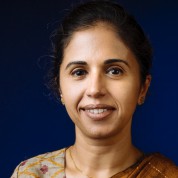PS 3.3
Moving Futures: Migration, Labor, and the Health of a Changing Planet
30
Jan
Currently, the United Nations estimates there are about 304 million international migrants in the world, which equates to 3.7 per cent of the global population. But increasing numbers of people are being displaced, within and out of their country of origin, because of conflict, violence, political or economic instability as well as climate change and other disasters. In 2024, there were 123 million people forcibly displaced globally, including 73 million internally displaced people. (UN DESA, 2024; IOM World Migration Report, 2024)
Global health in the 21st century will be transformed by these evolving and expanding challenges with migrants deeply intertwined at multiple levels. Migrant labor is essential to the functioning of economies, particularly in sectors like agriculture, construction, domestic work, and healthcare. However, migrant workers often face exploitative conditions: informal contracts, lack of legal protections, unsafe workplaces, and exclusion from labor rights and benefits. These vulnerabilities are heightened for irregular or undocumented migrants, who may accept hazardous jobs due to limited options. Current geopolitical dynamics raise additional concerns and challenges for global migration, particularly for the health and wellbeing of migrants.
Globally, there is increasing demand for international migrants to support long-term care, including the outmigration of health personnel to developing countries, exacerbating the health labor shortage in developing countries.
Climate change is also altering migration patterns. Rising sea levels, extreme weather events, and droughts are already displacing communities, particularly in the Global South. As traditional livelihoods become unsustainable, people are pushed to urban centers or across borders in search of work. These climate migrants often end up in precarious labor markets, further compounding their exposure to health risks and economic exploitation.
Health outcomes for migrants are shaped by a complex interplay of social, environmental, and political factors. Upon arrival in host countries, migrants may face barriers such as language differences, discrimination, and limited access to healthcare services. Even when services are available, fear of deportation, cultural misunderstandings, and financial constraints often deter migrants from seeking care. Occupational health is a critical concern. Migrant workers are frequently employed in high-risk industries with little protection—resulting in elevated rates of injury, chronic illness, and mental health disorders.
References:
- IOM-UN Migration. World Migration Report, 2024. ISBN (PDF) 978-92-9268-598-0
- UN Department of Economic and Social Affairs (DESA), International Migration and Sustainable Development. December 2024
- Editorial. The uncertain future of migrant and refugee health. Lancet. Vol 405:2103. June 14, 2025. https://www.thelancet.com/action/showPdf?pii=S0140-6736%2825%2901245-0
- Severoni S, Marotta C, Borghi J. Universal health coverage in the context of migration and displacement: a cosmopolitan perspective. Lancet. June 16, 2025, 1-3. DOI: 10.1016/S2468-2667(25)00117-3
- WHO on refugee and migrant health: https://www.who.int/health-topics/refugee-and-migrant-health#tab=tab_1
- UNHCR on forced displacement: https://www.unhcr.org/refugee-statistics#_ftn1
- World Bank report on climate change and migration: https://openknowledge.worldbank.org/entities/publication/2c9150df-52c3-58ed-9075-d78ea56c3267
- WHO global action plan on promoting the health of refugees and migrants, 2019–2030: https://www.who.int/publications/i/item/9789240093928
- Health Policy Watch report: https://healthpolicy-watch.news/who-to-shrink-its-geneva-headquarters-down-to-just-four-divisions-with-health-systems-a-key-pillar/
This parallel session will seek to identify actionable steps to address the manifold challenges related to global migration, labor, and health, including:
- Expanding universal health coverage to include undocumented and cross-border migrants.
- Ensuring occupational and environmental health protections for migrant workers in high-risk sectors.
- Integrating migration and displacement into national climate adaptation strategies.
- Strengthening transnational legal frameworks that uphold migrant rights and health access.
- Understanding how ageing populations shape the demand for female migrant caregivers.
- Supporting community-based organizing and data sovereignty efforts led by migrants.
PANELISTS
Biosketch
Betty Barkha
Kelly Perry
Nyan Linn
Otto Nzapfurundi Chabikuli
Phongsak Nitikaroon
Poonam Dhavan
Santino Severoni
Timothy Mastro









